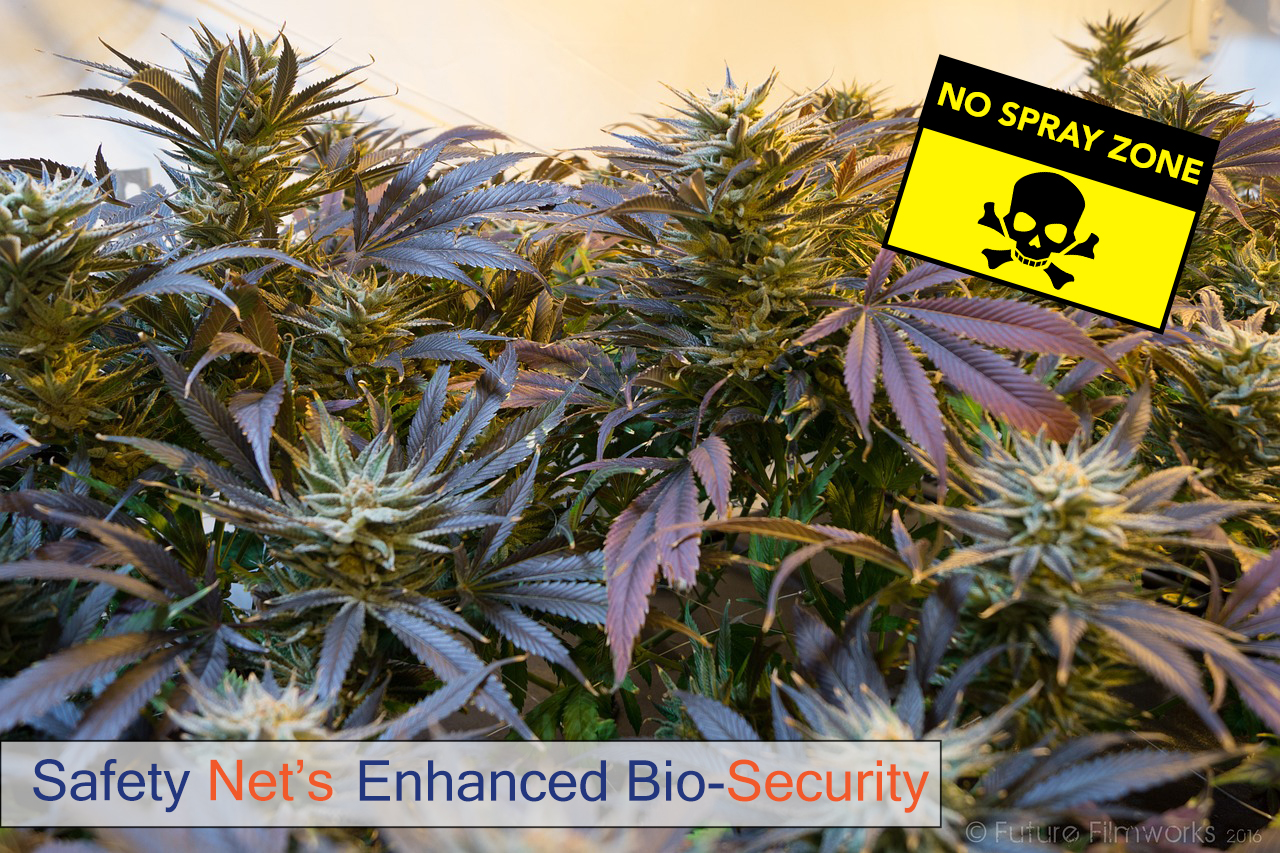Article written by Daniel Gana for Safety Net.

Introduction
The cannabis industry has a pesticide problem with a simple environmental solution. Every year, millions of dollars are lost to pathogens and their activities on cannabis farms. These huge losses affect pre-harvest and post-harvest operations. The most prominent of these challenges is product recalls which can be avoided with the right environmental solution to common contaminants like molds, pesticides, fungi, and bacteria.
In December 2022, The Oregon Liquor and Cannabis Commission (OLCC) reported the recall of 9,300 products still on sale and 13,600 already purchased due to possible pesticide contamination. There were also traces of mold and fungus growth due to high levels of moisture after packaging. A 2019 research shows that diverse pesticides directly or indirectly pollute the air, water, soil, and ecosystem, leading to health hazards. According to the WHO pesticides are among the leading cause of death by self-poisoning, especially in low- and middle-income countries. In 2015, about 30,000 packages of marijuana-infused edibles were recalled in Colorado due to potential pesticide contamination.
As the need for cannabis products skyrocket, farmers face the dilemma of increasing production at the mercy of pest and diseases. Pest and diseases like mildew, HPLV, molds, and fungi have continued to plague cannabis farms, with farmers seeking solace in pesticides that leave residues in the plants. These pesticide-contaminated plants or products serve as a potential route of pesticide exposure to patients with neurological diseases, thus worsening their burdens and outcomes.
Pesticides have been found in all cannabis products, from flowers to edibles, vapes, and smokes. Information from research shows that rather than alleviating a patient’s condition, pesticide-contaminated cannabis harms the patients and exposes them to more adverse effects.
Note that the cannabis plant acts as a sponge that sucks up compounds from the soil. This is why some researchers are considering its possible use in cleaning polluted soils. So far, researchers have discovered the potential benefit of cannabis in bioremediation and cleaning up soils contaminated by fertilizers, pesticides, and heavy metals like cadmium and lead.
The pesticide pandemic in the cannabis industry needs urgent attention and calls for a need to abandon the archaic, harmful chemicals for processes that protect the plants by focusing on “the source of infection rather than dealing with the infection after it has manifested in the plant”. The pesticide problem in the cannabis industry stemmed from the need to keep the plant free from pests, fungi, bacteria, and molds, which can be prevented by maintaining an aseptic growing environment. It is pertinent to note that pesticides won’t be needed when plants are grown in a conducive and aseptic condition. This is why we can confidently say the cannabis industry has a pesticide problem with an environmental solution.
How We Aim to Address the Pesticide Problem in the Cannabis Industry
Although pesticides have always been a go-to solution for farmers who want to rid their farms of pathogens, the parameters have changed. They are now focused on eco-friendly solutions that deal with pathogens without compromising product quality or consumer and environmental safety. Over the years, the WHO and environmental protection agencies worldwide have channeled their strength to promote eco-friendly products that minimize environmental pollution while prioritizing consumer safety.
While product recalls may look simple, they are expensive and may likely send a cannabis company out of business. It may lead to losing confidence in the company’s ability to deliver quality products. So, what’s the solution to the pest and disease problems of the cannabis industry? Well, that’s where Bio-Security programs from Safety Net come into the picture.
Safety Net offers a range of products and services that have been proven effective in various agricultural-related areas that take care of contamination from the source. Their products and services focus on environmental cleaning, disinfection and protection products, UV disinfection products, air purification products, and water purification solutions. Safety Net’s eco-friendly products have the potential to eliminate the need for pesticides and give farmers a chance to save more with less costly products while dealing with pathogens with ease.
As the cannabis market keeps expanding, with more countries and regions legalizing it for recreational and medicinal use, it is becoming stricter and highly competitive. This includes an increasing need for more safety-compliant and healthy products. Companies that fail to meet the new market standard will be thrown out and replaced in the long run as regulations change and big companies and pharmaceutical labs enter the market and will adapt and produce eco-friendly ways of producing products.
With Safety Net’s Bio-security program, farmers can enjoy larger, healthier plants with the potential for more yield, which means higher profit margins. When compared annually, they offer a process where the cost of products to clean, disinfect and protect the growing environment is less than the cost of pesticides and other growth enhancement products.
Our products at Safety Net America have a broad use case, as they can be applied to any form of agriculture currently suffering from the pesticide pandemic. So far, our products have shown good results in cannabis, wine growing, food packaging, chicken house, and much more.
Conclusion
Pathogens are a pain in the neck of every breeder. They affect the quality and quantity of yield, thus defeating the aim of cultivation. With Safety Net’s Bio-Security program, your cannabis farm will be safeguarded from pathogens while maintaining your product’s compliance and safety. Their products and services are designed to safeguard environments beyond the normal approach to disinfecting. They are not only the trusted partner to address the needs of your business today but the partner to trust in developing solutions for the needs of tomorrow in the rapidly evolving cannabis industry.
For more information on Safety Net’s Bio-Security program and what they can do for you, contact them at info@safetynetamerica.com.

